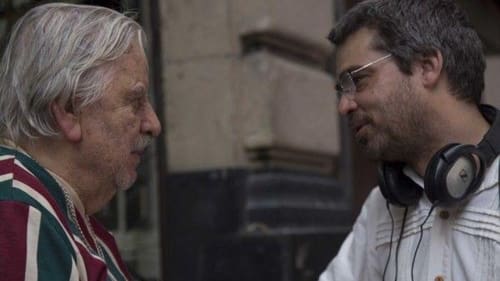Suzana de Moraes
Birth : 1940-08-15, Rio de Janeiro, Rio de Janeiro, Brazil
Death : 2015-01-27

Self (voice)
Documentary about Brazilian poet Waly Salomão, for whom life was always a fictional film and poetry was a way to expose any naturalistic pretension. His convictions affected many friends like Antonio Cícero, Caetano Veloso and the film's director Carlos Nader, who shoot Waly for 15 years. But how does one do a documentary about someone who believes everything is fiction?

herself

Herself
Documentary about Marcel Camus' 1959 film Black Orpheus, its cultural and musical roots, and its resonance in Brazil today.

Voice
Brazilian short film, directed by Julia Murat.

O AMOR NATURAL is a documentary film about the erotic poetry of one of the greatest Latin American poets of the 20th century, the Brazilian Carlos Drummond de Andrade (1902-1987). The erotic poems of Carlos Drummond de Andrade, a household name in Brazil, remained unpublished during his lifetime, as he feared they would be deemed pornographic. In this celebration of his poetry and sensual vision, elderly residents of Rio read his poems and comment on their graphic, voluptuous imagery with tremendous candor and enthusiasm.

Director
Alice faces a lot of trouble to make a film about artist Marcel Duchamp. She randomly chooses musician Antônio for the main part, and ends up having an affair with him. (imdb)

Driver who was left by his wife, who wanted to try a career in the movies, has to deal with their son's revolt when the latter finds his mother, whom he thought dead, singing in a nightclub.

Self

Director
A documentary on Brazilian poet and composer Vinicius de Moraes, made by his daughter a few months before his death.

Villa-Lobos
Fantasy comedy about Brazilian writer Oswald de Andrade, one of the most important icons of Modernism in Brazil. In the film, Oswald is played by two actors: Ítala Nandi, as his feminine anima, and Flávio Galvão, as the masculine half.

A caboclo's soul wanders through purgatory (or hell), visiting many places until he boards a ship whose destination is unknown.

A millionaire lives in a sinister cottage where strange events unfold. A damned creature, he transforms himself in a werewolf and leads a following whose adepts spread horror and despair in the neighboring city, becoming themselves a clan of assassins. One day, the werewolf confronts Branca Justiça (White Justice), who summons benign forces to scathe them and frees him of his own wickedness.

Successful manager is haunted by a sinister character who enters his dreams, Dr. Moura Brasil.

Suzana
The eccentric members of a wealthy Brazilian family each go through personal torment, debauchery and intense guilt in this symbolic and gory film. The father has made a fortune in the slaughterhouse business and ignores the feelings of his wife and his workers. He frequents a mulatto woman, who is always seen naked. His daughter and her friend act on their lesbian fantasies before her friend marries her brother. An elderly aunt seduces the brother before she drowns herself in the swimming pool. His lesbian sister shoots the girl, and the boy incestuously attacks his mother. When the mother threatens to leave, the father begs for her to stay and continue the hollow charade of their marriage for the sake of social appearances. The father grovels before his mistress after his daughter slashes her wrists. Any comparison between this dysfunctional family, the Manson family, and Shelley Winters' sick Barker brood in Bloody Mama is all an unfortunate artistic coincidence.

Daily scenes of a grotesque family living in the metaphorical island of Babaloo.

Two maids decide to rebel against the society that oppresses them and start murdering their own mistresses. “???????????? ???????????????????? ???????? ???????????? ???????????????????????? ???????? ???????????? ????????????????????????, ???????????? ???????????????????????????????????? ???????????? ???????????????????????????? ???????????????? ???????????????? ???????? ???????????? ???????????? ???????????????????????? ???????? ???????????????? ???????????? ???????? ???????????????????????? ???????????????? ???????????????? ???????? ????????????????????????????????. ???????? ???????????????? ???????????????? ???????????????????? ????????????????????????????. ???????????????? ???????????????? ???????????????????????????????????? ????????????, ???????????? ???????????????? ???????????????????? ???????? ????????????????????????????, ???????????????? ???????? ???????? ???????????????? ???????????????????? ???? ????????????????, ???????????? ???????????????? ???????? ???????? ????????????????????????????????.”


Chronicles the life of a 17 year-old girl living in the upper-class Rio de Janeiro neighbourhood of Ipanema. Márcia lives a life of parties and spend her days among bohemians, musicians and intellectuals. While seeming happy in the outside, she's extremely anguished inside. Based on the famous song by Antonio Carlos Jobim and Vinicius de Moraes.

Self
Documentary about Maria Bethânia, at the very beginning of her career as a singer, when she arrived in Rio da Bahia to replace Nara Leão in the show Opinião. Bethânia's appearance, at that time in southern Rio, was a cultural shock that shook the city. The film also contains scenes of her daily life and meetings with other musicians.












